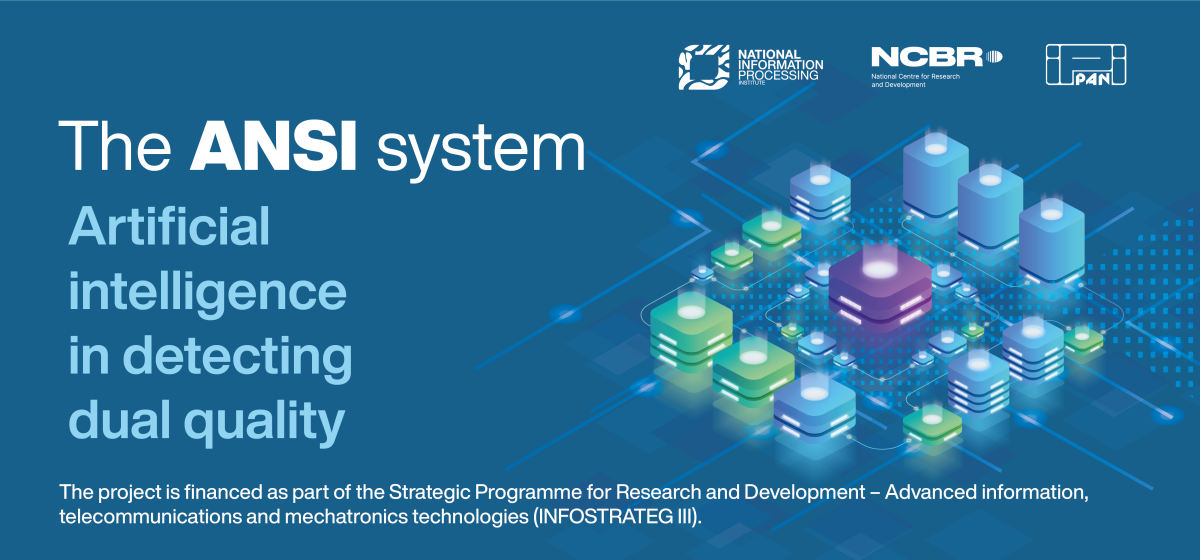The dual quality of products is a problem that persists on the market, despite associated practices being strictly forbidden by European Union regulations. They stipulate that the same products that are purchased in Germany, Sweden and Poland should be of the same quality; however, the quality of goods sold by some manufacturers in Poland remains inferior to that of those traded elsewhere in the bloc. This problem can be solved using artificial intelligence (AI). Experts at the National Information Processing Institute (OPI) and researchers at the Institute of Computer Science of the Polish Academy of Sciences (IPI PAN) have developed ANSI, an IT system that identifies consumer opinions on the safety and quality of products, including their dual quality. The system will be financed by the National Centre for Research and Development (NCBR) as part of the INFOSTRATEG III programme.
Artificial intelligence that protects consumer rights
In increasingly globalised markets that offer significant volumes of products and services, unscrupulous firms find it easy to bypass official control measures, and consumers are hard-pressed to identify unfair commercial practices. The capabilities of a single person, or even a group of people tasked with manual analysis, are limited. The staff of the institutions that are responsible for product monitoring and supervision are unable to scrutinise all of the products on the market. This is where AI comes in.
‘The National Information Processing Institute is becoming an expert in providing modern tools to protect consumer rights. We are already implementing a system for the Polish Office of Competition and Consumer Protection (UOKiK) that detects illegal clauses in agreements. Now, alongside experts at IPI PAN, we are going to develop a tool that counters dual quality. Both solutions rely on AI, which helps us take better care of consumers and their rights,’ says Dr Jarosław Protasiewicz, Head of OPI.
The ANSI system will be developed and implemented fully by 2025. The tool will be used to identify consumer opinions on the safety and quality of products, including dual quality.
‘Cutting-edge natural language processing methods will help us to identify products in Poland whose quality should be analysed not only in laboratories, but also based on online opinions. By using AI methods, we want to take the advantage of the fact that large portions of our lives have been transferred online,’ says Dr Łukasz Kobyliński, assistant professor in the Linguistic Engineering Group at IPI PAN, and IPI PAN task manager for the ANSI project.
ANSI and multilingual data
ANSI will rely on artificial intelligence methods and techniques, including machine learning and deep learning. The system will be used to identify products based on multinational preferences and multilingual online consumer opinions. The data will be analysed thoroughly and used to issue recommendations on whether products should be further examined in a laboratory. These methods will be applied to the development of models that pertain to internet opinion extraction and structuring, identification of languages in which opinions are posted, sentiment analysis, and recommendations on whether products should be examined in laboratories.
The unique solution will be developed as part of a project financed by NCBR as part of the INFOSTRATEG III programme.
‘Our tool will help identify consumer opinions on the basis of multilingual online resources, such as auction and e-commerce websites, forums, the websites of consumer law enforcement institutions, and the portals of consumer organisations. The solution will identify products whose quality differs between the markets. ANSI will be of great assistance to the staff of UOKiK,’ says Dr Marcin Mirończuk of the Laboratory of Intelligent Information Systems at OPI.
Identification of dangerous and low-quality products
ANSI will comprise an internet data collection module and an information analysis and processing module, which will be supported by a dedicated algorithm. The data collection module is designed to cleanse, preprocess and extract data. The information analysis and processing module will incorporate models that detect languages, analyse opinion sentiments, identify dual-quality products, and recommend such products for laboratory testing, as well as a web platform that provides access to the models, the data collected and the results of the analyses. The aim of the project is to create a high-quality database of products, product opinions and laboratories, and a ready-to-implement IT system that will serve the needs of UOKiK . The highly versatile ANSI system can be integrated with other systems that provide product information and opinions on products. The solution will also support the identification of dangerous and low-quality products, with special regard to dual quality. ANSI can be implemented flexibly and integrated with external authorisation and authentication systems. ANSI will be subsidised by NCBR as part of the Strategic Programme for Research and Development – Advanced information, telecommunications and mechatronics technologies (INFOSTRATEG III).
